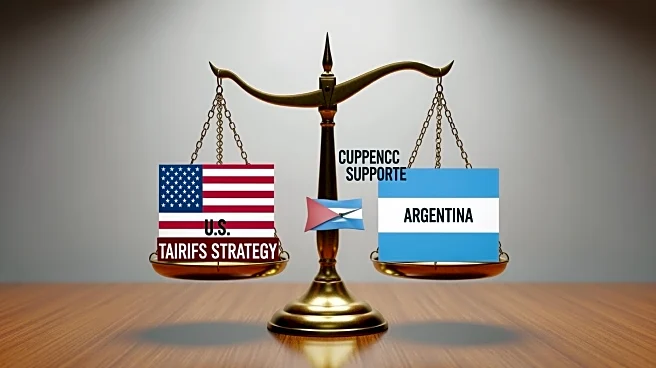What's Happening?
Treasury Secretary Scott Bessent has defended the U.S. administration's decision to impose an additional 10% tariff on Canada following an anti-tariff TV ad aired by Ontario's government. In an interview on NBC's 'Meet the Press,' Bessent described the ad as 'psy-ops,'
or psychological operations, against U.S. citizens. The ad, featuring remarks from President Ronald Reagan, was criticized by President Trump as a 'misrepresentation of the facts.' Concurrently, Bessent addressed the U.S. currency swap line extended to Argentina, emphasizing that it aligns with the 'America first' policy by supporting a U.S. ally without taxpayer losses. The move has faced criticism from some Republicans, but Bessent assured that the funds come from the Treasury Department's Exchange Stabilization Fund, which has a history of financial stability.
Why It's Important?
The imposition of tariffs on Canada and the financial support to Argentina highlight the complexities of U.S. trade and foreign policy under the current administration. The tariff decision could strain relations with Canada, a key trading partner, while the support to Argentina aims to stabilize a friendly government in Latin America. These actions reflect the administration's strategic use of economic power to influence international relations and maintain geopolitical stability. The decisions have sparked debate over the 'America first' policy, with implications for U.S. economic interests and international alliances.
What's Next?
The Supreme Court is set to hear arguments on November 5 regarding President Trump's authority to invoke the International Emergency Economic Powers Act for tariff imposition. This legal challenge could impact the administration's ability to enforce tariffs and shape future trade policies. Additionally, the economic situation in Argentina remains precarious, with potential currency devaluation on the horizon. The U.S. will need to monitor the effectiveness of its financial support and its impact on regional stability. Stakeholders, including political leaders and economic analysts, will be watching these developments closely.
Beyond the Headlines
The use of economic measures as a tool for foreign policy raises ethical and strategic questions about the balance between national interests and international cooperation. The administration's approach to tariffs and financial support reflects a broader trend of leveraging economic power to achieve geopolitical goals. This strategy may influence future U.S. foreign policy decisions and the global economic landscape.















